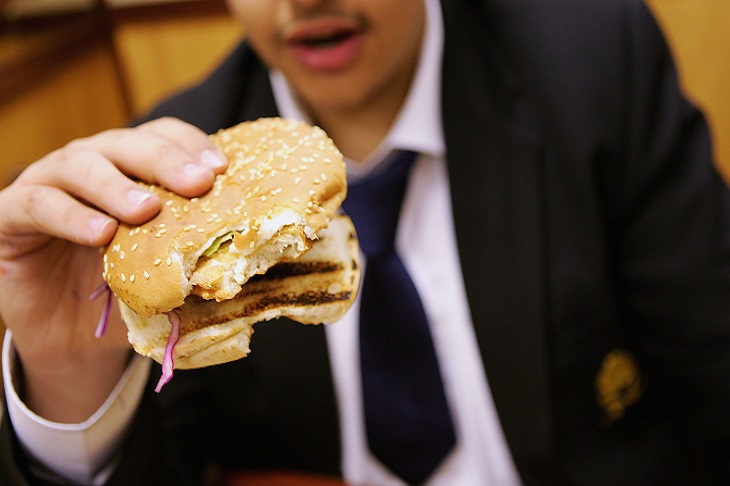‘Your refusal has cost all of us,’ President Biden said to the unvaccinated in September, announcing a new Covid vaccine mandate.
Mysteriously, President Biden (or any other world leader for that matter) is yet to set foot on a stage and make similarly disparaging comments to the overweight, the obese, and the poorly exercised.
So far there have been 275 million cases of Covid worldwide and 5.36 million deaths. Not a small number by any stretch, but in 2016 the World Health Organisation estimated there were 1.9 billion overweight adults around the world, with 650 million of those being classified as obese.
If this is not a public health crisis on a scale at least equal to, if not greater than, Covid – then what is?
Between 1975 and 2016 the prevalence of obesity nigh tripled, in a trend that is only accelerating. The report Weighing in: Australia’s growing obesity epidemic indicated the financial burden of obesity in Australia is estimated to be $11.8 billion per year and growing fast.
The cost of obesity alone over the next decade would comfortably pay for our nuclear submarine program, critical to our nation’s security, and then some. Those figures consist of $5.4 billion in direct health costs and $6.4 billion in indirect costs.
With the number of obese Australians doubling in the past decade from 2.7 million to 5.8 million, at current trends, 40 per cent of Australians will be obese within the next 10 years.
4,000 cancer cases in Australia each year are ‘caused by overweight and obesity and 7 per cent of the total health burden is due to overweight and obesity’. Obesity killed an estimated 5 million people worldwide in 2019 alone (a similar number of deaths as Covid at 5.36 million since the pandemic began) and also displays a strong correlation with critical illness and major severity of Covid manifestations.
It is justifiably curious then, that no world leader has seen fit to make such strident comments about the under-dieted and under-exercised. Where are the calls for a lockdown until we can dismantle fast food stores, you might ask? Where are the calls for $20,000 fines for those caught walking insufficiently briskly in public, or having the gall to order that extra cake for dessert? Perhaps we ought to mandate boot camps in the parks before work…
For, if Covid has taught us anything, no freedom or right is too important to be curtailed in the face of a burgeoning health crisis. Indeed, opposing such curtailment outs you as misinformed, selfish, and – dare I say it – dangerous.
To the overweight readers who fervently supported government policy responses around the world to Covid (at the expense of civil liberties), I have only one thing to say to you – when it comes to your [lack of] diet and exercise regimen: ‘Your refusal has cost all of us.’
Ah, before you get ahead of yourself (you may ask me), what do the ‘experts’ have to say? For surely, we must listen to the experts who would render unto us ‘the science’ of the matter.
Well, this is precisely the kind of crazy that ‘experts’ in the UK have been calling for, of late, with proposals including ‘closing down fast-food outlets, banning sweets at checkouts, outlawing discount deals on alcohol, and extending sugar taxes to milky drinks’.
The Australian Medical Association is already on the front foot in this space, supporting the ban on soft drinks in hospitals. The journal article that this author drew some of the statistics on obesity from concludes ‘large scale global interventions, such as food market regulation, food formulation and food taxation, are needed at a governmental level to implement policies in the public interest to counteract obesity’.
So, will we listen to the experts?
Perhaps we could establish an exercise credit system, (akin to the long-touted carbon emissions trading scheme). For every 30 minutes of exercise each day you receive an exercise credit which can either be used to buy unhealthy food or sold-on to someone else.
The elephant in the room must also be addressed; if your first impulse was to distinguish the analogy on the basis that obesity is not contagious, think again. Not just is that refusing to see the forest for the trees, but a study tracking a social network of more than twelve thousand participants for 32 years found that people were most likely to become obese when a friend became obese and the increased likelihood of becoming obese was a whopping 57 per cent.
Of course, it’s not truly contagious in the way Covid is, but the idea that obesity exists in an individual patient-client-care vacuum without negative externalities to others (outside just the financial burden of socialised healthcare) must be roundly dismissed. At the very least, those around us shape our perceptions of normality.
It goes without saying that the under-dieted and under-exercised should be denied ‘universal healthcare’ – make them pay – particularly if the specific health issue is even potentially or tangentially relevant to their weight or inactivity (à la no organ transplants for the unvaccinated due to immunosuppression).
We will ignore for a moment that, oxymoronically, proponents of ‘universal healthcare’ clearly seem to actually mean ‘universal healthcare so long as you agree with my ideological priors, or are happy to keep your mouth shut and play ball’.
For the abundance of clarity, no, this is not actually a call to do any of the things proposed above.
Instead, it is intended to be a light-bulb moment. To engender a recognition that, once removed from media hyperventilation and moral panic, our societal and political response to Covid has been outright dangerous to our freedoms (and has the potential to be far more ruinous if not kept in check).
The last 18 months have shown that, under the guise of public health emergency, not even your right to leave the home to see your friends, family or loved ones is safe from the unelected pen of a bureaucrat; who does not find themselves engaged in a weighing of all the pros and cons of their proposal but solely focused on the discrete issue of viral spread.
This is neither good, accountable governance – nor is it limited and reasonable. A single public servant should never have the power to move entire states to a stand still at their whim, yet that is now de rigueur across our country.
Of course, many of the arguments relied on by the lab coat class of ‘experts’ are predicated on taxpayer-funded ‘universal healthcare’ – i.e. minimising tax burden and unfairness of others paying for bad choices (see: smoking; adrenaline sports). It’s refreshing to see advocates move away from this idea and towards a user-pays system. Unfortunately, they presently seem unwilling to expand this beyond just punishing those who have not been vaccinated – but baby steps.
This is not downplaying the pandemic either, millions of deaths and hundreds of millions of infections is a public health crisis. Eventually though, like most things, Covid will fade. The concern is that the appetite for control of our medical health in our experts and political leaders does not.
We tread a dangerous line and, sooner rather than later, we must pull-back for fear the more laughable suggestions herein become reality.
To paraphrase, life appears to be imitating art far more than art is imitating life right now.
Got something to add? Join the discussion and comment below.
Get 10 issues for just $10
Subscribe to The Spectator Australia today for the next 10 magazine issues, plus full online access, for just $10.

























Comments
Don't miss out
Join the conversation with other Spectator Australia readers. Subscribe to leave a comment.
SUBSCRIBEAlready a subscriber? Log in